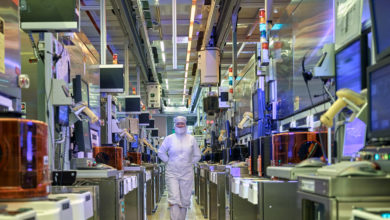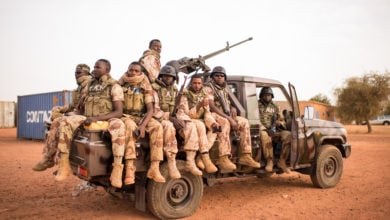The author represented the ANSWER Coalition (Act Now to Stop War and End Racism) at the People’s Action Week Against the WTO in Hong Kong where tens of thousands of people battled with riot police and became the focus of international media attention.
 Nathalie Hrizi, third from left, next to Luis Jalandoni, chief negotiator for the National Democratic Front of the Philippines. Photo: ILPS |
Since its inception in 1995, the World Trade Organization has gained notoriety for its instrumental role in destroying the livelihoods of workers and peasants throughout the world. The WTO is one of many institutions, like the G8, the International Monetary Fund and the World Bank, that undermine the sovereignty of nations by forcing the implementation of disastrous neoliberal economic policies of privatization, liberalization and deregulation.
The World Trade Organization is one of the most powerful legislative and judicial bodies in the world. It oversees global trade in goods and services. Unlike the other institutions mentioned, the WTO has a thin veneer of “one country one vote” democracy. In reality, the WTO is dominated by the United States and used by all imperialist countries to bully less developed nations into opening their markets and undercut the living conditions of their people. Massive subsidies provided by the government to agricultural producers and manufacturers in highly industrialized countries, like the United States, have been among the most contentious issues at each ministerial meeting.
From Dec. 13 to 18, 2005, ministers and government officials from 148 countries, along with corporate representatives, lobbyists and nongovernmental organizations, met in Hong Kong for the “6th WTO Ministerial Conference.” Thousands of workers, peasants, students and others from across Asia and all over the world greeted them with militant protest. Activists labeled it the “People’s Action Week Against the WTO.”
The People’s Action Week, organized by the Hong Kong People’s Alliance, included protests, forums and rallies that raised consciousness and articulated the attending groups’ positions against globalization and militarism.
People’s action against the WTO
 Anti-WTO protestors battle Hong Kong police. Photo: Nathalie Hrizi |
Thousands of people rallied in Hong Kong’s Victoria Park and marched to near the Convention Center, where the WTO meetings were taking place. At least 50 Korean farmers jumped in the water in an attempt to swim to the convention center, while others clashed with lines of police armed with pepper spray, bean-bag guns and riot gear. The cops were there to ensure that the capitalists and their allies could deliberate in private. Throughout the WTO meetings, student groups, farmers, women and workers demonstrated in large numbers.
On the final day of the WTO meetings, the Convention Center was under siege by a demonstration led by the 1,500-strong Korean delegation. Demonstrators battled the police for hours using the cops’ own riot shields and metal barricades as weapons. Hundreds of the protesters then staged a sit-in until the early morning hours when the police arrested them. The delegates and lobbyists in the Convention Center were unable to leave during the actions.
Since 1999, when protests shut down the WTO ministerial meetings in Seattle, militant activists have continued to target WTO gatherings. The suicide of a Korean farmer, Le Kyoung Hae, at the 2003 meetings set the stage for yet another failure of the WTO talks. The protests have become a significant factor in preventing the WTO from achieving its exploitative aims.
Hong Kong meetings yield little
The WTO ministerial body is under pressure from the U.S. government to conclude the current round of negotiations, called the Doha Round, within the next six months. The timing is important because President Bush’s authority to “Fast Track” trade agreements is about to end. “Fast Track” allows Bush to approve and negotiate trade agreements with almost no Congressional oversight.
Despite the pressure, WTO leaders set the Hong Kong meetings’ objectives much lower than what they originally wanted. Right before the meetings, they became worried that another failure at the hands of the people’s movement would be a significant setback for the WTO and its leading imperialist backers. (Third World Network, Nov. 9, 2005) Once billed as the meeting in which a final framework would emerge, the December 2005 meeting of the World Trade Organization, in fact, accomplished very little. (Power and Interest News Report, Dec. 8, 2005)
Agricultural subsidies provided by rich governments to strengthen the position of their own agribusiness corporations was a major point of contention. The final Hong Kong agreement stated that the United States and European Union would end export subsidies by 2013, three years later than demanded by developing countries. Governments pay export subsidies to private producers to encourage the export of specified products and guarantee profits.
The agreement is being hailed as a benevolent move by these rich markets to accommodate products from less developed nations. But export subsidies are small compared to outright domestic aid. At the meetings, Venezuelan Minister Ali Rodriguez exposed this hollow reform: “developed countries invade the world with their subsidized products and, as if it were nothing, hermetically seal their borders to the products of global south.” (Venezuelanalysis.com, Dec. 16, 2005)
While the WTO has forced less developed nations to cut subsidies, the United States and European Union increase subsidies to agriculture and key industries yearly. A 2005 Oxfam report notes “the total illegal subsidies … amount to $4.2 billion for the EU and $9.3 billion for the USA in one year alone.” (Truth or Consequences Oxfam Briefing Paper, Nov. 2005) The report focuses only on a few traded goods. For instance, the United States is the world’s top producer and exporter of corn. U.S. agribusiness would have lost a total of $20 billion in the last five years if the government had not granted it $25 billion in subsides. At the same time, the price of corn in Mexico has dropped 70 percent since NAFTA was implemented in 1994.
‘Junk the WTO’
One outcome of the Hong Kong meetings was the expanded solidarity of the least developed countries that together formed the “Group of 110” poor countries, in contrast to the G8, the largest imperialist countries and Russia. For the first time in the WTO’s history, the developing countries formed a bloc to coordinate their development forces.
Some nongovernmental and progressive organizations argue that the WTO is capable of being reformed to promote “fair trade” that benefits the majority of the world’s people. But this view is false and has been repudiated by the most militant fighters for justice. The most popular slogan at the Hong Kong protests was, “Junk the WTO!”
Just like the World Bank, the IMF and all neoliberal institutions, the WTO is designed to enrich the wealthiest capitalists in the most developed nations. In November 2005, the World Bank estimated in a report that $287 billion could be gained from global trade liberalization. But the vast majority of the money gained would flow directly to the top. According to Tim Wise, deputy director of the Global Development and Environment Institute at Tufts University: “70 percent of the gains will go to developed countries.” (Reuters, Nov. 25, 2005)
Globalization and militarism
Ingrained in capitalism is the drive for ever-expanding markets. The WTO and similar institutions were created to help facilitate capitalist globalization, meaning the destruction of labor, social and environmental rights and publicly-owned property in the so-called developing world. Globalization means the elimination of any obstacle placed in the path of the largest transnational corporations and banks in their pursuit of access to and domination of every market in the world.
As people resist globalization, the primary imperialist governments resort to aggressive and destructive military intervention. The United States, for instance, has 730 bases in 130 countries.
To enforce its global ambitions, more than WTO-style neoliberalism is required. That’s why the United States has assembled a massive military machine. As pro-globalization New York Times columnist Thomas Friedman wrote in 1999, “The hidden hand of the market will never work without a hidden fist. … McDonald’s cannot flourish without McDonnell Douglas, the designer of the U.S. Air Force F-15. And the hidden fist that keeps the world safe for Silicon Valley’s technologies to flourish is called the U.S. Army, Air Force, Navy and Marine Corps.”
But the unbridled arrogance of the global capitalists is being met by militant protest both in their home countries and wherever their ministers and government representatives meet. In recent months, huge street protests in Argentina, South Korea, Hong Kong and elsewhere have shown the intensifying global people’s movement that rejects imperialism.
Articles may be reprinted with credit to Socialism and Liberation magazine.



